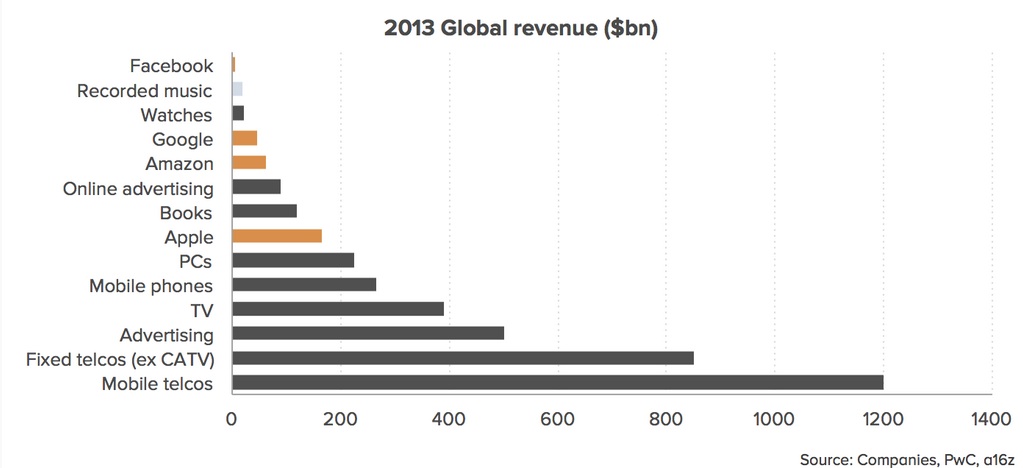Big screens, small houses
I was a TV critic for 13 years (1982-87 on the Listener, now sadly defunct; 1987-95 on the Observer, still going strong), so I feel I’ve paid my dues to the medium. I still watch TV occasionally, but rarely while it’s being broadcast (which is why, for me, the BBC iPlayer was such a great innovation). It’s “my schedule, not the scheduler’s schedule” now. And because I watch TV on devices other than ‘television sets’ I’ve paid very little attention to how the consumer market has developed over the last decade or so.
But the the other day I found myself walking through the local branch of John Lewis while en route to somewhere else and I found myself in the audio-visual department, where I was surrounded by gigantic screens. And then I was struck by the irony of what’s happening. All over the country, developers are building new apartments consisting of ever-smaller rooms, while at the same time manufacturers are building ever-bigger flat-screen TVs. If these two trends continue then we are on course for an interesting collision.
And then I stumbled on this nice piece by Douglas Coupland, in which he writes
big-screen TVs are ugly. In the history of human technology, there have been few inventions whose intrinsic ugliness and brutality of form defy all notions of beauty and defeat everything we call “home”.
Trying to put a big screen in a domestic space and have it look natural is almost impossible, like having a 2001: A Space Odyssey monolith inserted into your life – a monolith that has total disregard for your humanity or taste. The black minimalist box on your wall negates your framed wedding photos, your cornices, your art collection, your potted plants. The only environment it looks passably OK in is a modern house built after 2008 that factors in the bizarre scale of big screens – and even then, when you see one passably installed, you feel like you’ve walked into Muammer Gaddafi’s bedroom.
Yep.
Our Kafkaesque world
This morning’s Observer column.
When searching for an adjective to describe our comprehensively surveilled networked world – the one bookmarked by the NSA at one end and by Google, Facebook, Yahoo and co at the other – “Orwellian” is the word that people generally reach for.
But “Kafkaesque” seems more appropriate. The term is conventionally defined as “having a nightmarishly complex, bizarre, or illogical quality”, but Frederick Karl, Franz Kafka’s most assiduous biographer, regarded that as missing the point. “What’s Kafkaesque,” he once told the New York Times, “is when you enter a surreal world in which all your control patterns, all your plans, the whole way in which you have configured your own behaviour, begins to fall to pieces, when you find yourself against a force that does not lend itself to the way you perceive the world.”
A vivid description of this was provided recently by Janet Vertesi, a sociologist at Princeton University. She gave a talk at a conference describing her experience of trying to keep her pregnancy secret from marketers…
If you think the music industry is a big deal, think again
Given all the noise the recording industry makes — and the idiotic amount of attention it gets from government ministers — you’d be forgiven for thinking that it was one of the most important industries on the planet. In fact, as this chart shows, it’s minuscle compared to the industries that drive our economies. It’s about the same size as the watch industry. That doesn’t mean that it isn’t important to those who work in it, or that its future doesn’t matter. But let’s have a sense of proportion about it.
HT to Benedict Evans for highlighting the chart.
Net Neutrality in pictures
Valiant attempt to explain something that most politicians don’t appear to get.
Deadlines
Nice cartoon in the New Yorker. Shows a journalist frantically typing and saying to a bemused colleague: “I’m listing my deadlines by due date so I can miss them in chronological order.”
The French exception
Thomas Piketty’s book has taken the Anglo world by storm, but has been out for two years in France without generating anything like the same fuss. Why?
One reason, perhaps, is that the French didn’t think it was left-wing enough. Another reason, muses the Economist,
is that questions about inequality, the centrepiece of Mr Piketty’s research, have long been central to the political debate in France, a country that already has an annual wealth tax on assets. This has been true for the right as much as for the left. Jacques Chirac, a Gaullist, was first elected president by campaigning to mend the country’s “social fracture”. Mr Hollande was at his most passionate on the campaign stump when denouncing the world of finance as his “chief adversary”, and the super-rich as “grasping and arrogant”. In short, drawing attention to resurgent inequality has a sense of novelty in America, but in France it is a political given.
That seems about right to me. I am reminded of the row there was many years about the decision to ‘rebrand’ Free Software as ‘Open Source’. The reason? Lots of people in the free software movement thought that it was being held back by the fact that the US corporate world sees the word “free” as synonymous with communism. It’s nuts, but that’s America for you.
Piketty: the gist
I’m reading Thomas Piketty’s Capital in the Twenty-First Century, which is unlike any other economics book I’ve read in the last twenty years.
It reminds one that his subject was once known as political economy for the very good reason that economics and politics really belong together. As Bertrand Russell once observed, “economics is the study of how people make choices while sociology is the study of how they don’t have any choices to make”, and since the absence of choices (aka inequality) is a political matter then writing about economics also involves writing about (small-p) politics.
Another distinctive thing about Piketty’s book is that it’s intensely readable and has lots of cultural references. In that sense, he’s more like Keynes than he is like, say, Kenneth Arrow. He knows the films of Tarantino, and has read Balzac and Jane Austen. He talks about our societies reverting to “the Downton Abbey world” of a century ago.
The book is a 577-page doorstep but, strangely, its central core is easy to summarise. Here’s how the Guardian‘s Economics Editor, Larry Elliott, puts it:
The gist of Piketty’s book is simple. Returns to capital are rising faster than economies are growing. The wealthy are getting wealthier while everybody else is struggling. Inequality will widen to the point where it becomes unsustainable – both politically and economically – unless action is taken to redistribute income and wealth. Piketty favours a graduated wealth tax and 80% income tax for those on the highest salaries.
Or, to put it even more simply: the capitalism we’ve got is unsustainable, and we need to do something about it.
Tweet of the Week
Twitter has a new ‘feature’ — a once-a-week email letting you know which of your tweets got most attention in the previous week.
Last week mine was:
So is Piketty the new Harry Potter? No: but he may be the next Fukuyama. tinyurl.com/li24hkf
What happens when algorithms decide what should be passed on?
One of the things we’re interested in on our research project is how rumours, news, information (and mis-information) can spread with astonishing speed across the world as a result of the Internet. Up to now I had been mostly working on the assumption that the fundamental mechanism involved is always something like the ‘retweet’ in Twitter — i.e. people coming on something that they wanted to pass on to others for whatever reason. So human agency was the key factor in viral retransmission of memes.
But I’ve just seen an interesting article in the Boston Globe which suggests that we need to think of the ‘retweeting’ effect in wider terms.
A surprise awaited Facebook users who recently clicked on a link to read a story about Michelle Obama’s encounter with a 10-year-old girl whose father was jobless.
Facebook responded to the click by offering what it called “related articles.” These included one that alleged a Secret Service officer had found the president and his wife having “S*X in Oval Office,” and another that said “Barack has lost all control of Michelle” and was considering divorce.
A Facebook spokeswoman did not try to defend the content, much of which was clearly false, but instead said there was a simple explanation for why such stories are pushed on readers. In a word: algorithms.
The stories, in other words, apparently are selected by Facebook based on mathematical calculations that rely on word association and the popularity of an article. No effort is made to vet or verify the content.
This prompted a comment from my former Observer colleague, Emily Bell, who now runs the Tow Center at Columbia. “They have really screwed up,” she told the Globe. “If you are spreading false information, you have a serious problem on your hands. They shouldn’t be recommending stories until they have got it figured out.”
She’s right, of course. A world in which algorithms decided what was ‘newsworthy’ would be a very strange place. But we might get find ourselves living in such a world, because Facebook won’t take responsibility for its algorithms, any more than Google will take responsibility for YouTube videos. These companies want the status of common carriers because otherwise they have to assume legal responsibility for the messages they circulate. And having to check everything that goes through their servers is simply not feasible.


